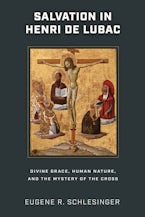Humanity is constituted by a natural desire for supernatural happiness in God. While this desire for the beatific vision is innate to humanity as spirit, our knowledge of it, de Lubac argues, depends upon divine revelation. This paradoxical state of affairs of a natural desire that can only be fulfilled supernaturally, and which is inscribed into our very being, but only knowable by revelation, lies at the heart of de Lubac’s theological epistemology, which itself gives ample room for and relies upon the notion of paradox.
De Lubac’s appeal to paradox stems from several interconnected commitments, which, taken in concert, allow us to fill out with greater depth the manner in which his thought is pervaded with a soteriological impetus. Our knowledge of God takes a paradoxical form because it is knowledge of a reality that utterly exceeds the capacities of our finite intellects, i.e., a Mystery. It is the nature of this Mystery that our apprehension of it goes beyond mere cognition. Rather, we are drawn and incorporated into it. This being drawn into the Mystery is at once the fulfillment of the natural desire and the telos of knowledge of God. It is, moreover, the basic meaning of mysticism in de Lubac’s mature thought. For de Lubac both mysticism and theology are means of engaging with Mystery and the relation between them clarifies what is at stake in his theological epistemology, namely the ordering of all of human life, including the theological task, to our participation in the life of the Trinity through the saving act of the incarnate Christ.
Mysticism and the Constitution of Humanity
De Lubac’s conception of Christian mysticism sheds considerable light on his theological anthropology, for it clarifies the nature of the fulfilment of that desire which constitutes the human nature. As we noted in the introduction, de Lubac understood his entire project to be, in some measure, animated by a vision of Christian mysticism, though he was unable to complete his desired book on the topic, neither is any major work devoted to it as such. Nevertheless, his1965 article, “Mystique et Mystère” gives considerable insight into his conception of Christian mysticism. Essentially mysticism consists in “a certain effective union with the Divinity...the tri-personal God of Christian revelation, a union realized in Jesus Christ and by his grace.” Set against the backdrop of the previous chapters, we can recognize this as essentially the fulfillment of humanity’s supernatural vocation and the human spirit’s natural desire for that fulfillment.
De Lubac makes this connection even clearer when he delineates those features that comprise a specifically Christian mysticism over against the various natural mysticisms or those belonging to different religious traditions. A Christian mysticism is in particular a “mysticism of likeness,” meaning that by virtue of being created in the image of God, humanity is called to be conformed to his likeness through the beatific vision. The distinction between image and likeness is crucial to de Lubac’s theology of the supernatural, as image corresponds to our vocation to union with God, while likeness names its fulfillment. Between the two there is a radical disproportion, so that we could never attain to this goal without supernatural aid. He explains, “A mysticism of only the image would be an awareness of oneself, of the depth of one’s being, without the gracious intervention of God by the gift of the mystery,” while as a “mysticism of likeness, Christian mysticism is by that very fact oriented forward, towards a term, towards God who calls us and draws us to the end of the road.” Hence, it involves an anagogic dimension, as this movement towards God can never be fully completed within this life.
Understood thus, we can see that de Lubac’s understanding of the image of God inhumanity more or less corresponds to spirit within his conception of tripartite anthropology. Both name our basic openness towards and vocation to God. This is borne out in de Lubac’s The Discovery of God, in which he writes, “God reveals himself continuously to man by imprinting his image upon him. That divine operation constitutes the very center of man. That is what makes him spirit.” Tellingly, de Lubac understands spirit to be the site of mysticism [Le lieu dela mystique]. It is here, in that aspect of our nature whereby we are open to and summoned to God, that mysticism, understood as the fulfillment of that summons, occurs.

